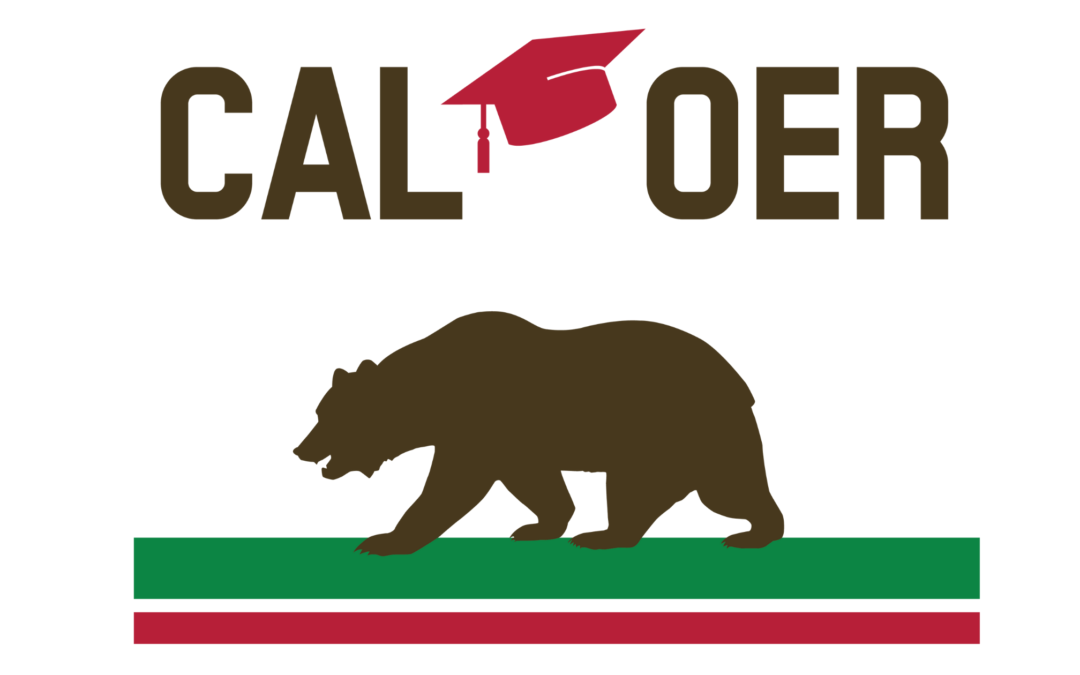Last week the inaugural Cal OER Conference convened for the first time the three systems of public higher education in California to provide a state-centric Open Educational Resources (OER) conference. The Michelson 20MM Foundation was pleased to sponsor this inaugural event, which received more than 950 registrants.
Serving All Students
Hal Plotkin, who served as Senior Policy Advisor in the Office of the Under Secretary during the Obama administration (2009–2014) and was president of the Foothill-De Anza Community College District Board of Trustees, kicked off the event with a keynote address. He focused on how OER can be more than just a substitute for traditional educational resources. In addition, they can be adapted to be more culturally sensitive, more collaborative, and more inclusive. He reminded attendees that thousands of faculty around the world have already contributed to the creation of OER because education “is in their hearts.” These resources are touching the hearts of students everywhere and changing the face of education. Hal implored faculty to remember that they are the first generation of faculty leaders who have been given permission to use the most powerful technologies ever created to make history and serve every student, everywhere, regardless of circumstance.
Other highlights of the first day at Cal OER included Michelle Pilati and Jennifer Paris, both from the Academic Senate for California Community College’s OER Initiative (ASCCC OERI), highlighting the work they have done and the challenges they encountered determining what OER needs exist in the largest system of higher education in the United States. Additionally, Delmar Larson, from LibreTexts, and Ron Oxford, from West Hills College Lemoore, led a session summarizing the activities and impacts of the U.S. Department of Education’s inaugural Open Textbook Pilot award to LibreTexts at UC Davis in 2018 and the CC ECHO Consortium led by West Hills College Lemoore in 2021. LibreTexts will provide an overview of the current state of construction, curation, adaptation, and adoption efforts, with an emphasis on activities in California. The CC ECHO consortium, made up of four California Community Colleges, is creating culturally relevant OER materials for 20 courses with high Latinx enrollments. The OER that is developed will have a diversity, equity, and inclusion lens and fill OER gaps at community colleges.
Delmar Larson was also featured on a panel later that day with Hugh McGuire, Founder and CEO of Pressbooks, where faculty could learn the similarities and differences of the two most popular OER textbook platforms available today: LibreTexts and Pressbooks. The panel was moderated by Michelson OER Fellow James Glapa-Grossklag. The final highlight from day one was a session featuring faculty and staff from Contra Costa, Diablo Valley, and Los Medanos Colleges on how they joined forces to transform small, independent OER efforts into a $500,000 district-wide program for student equity that is supported throughout the district.
Looking Toward the Future
The second day of the conference kicked off with concurrent sessions. Highlights from the morning included Sacramento City College faculty and staff sharing how they created a sustainable OER infrastructure that supports faculty engagement in OER. As part of the U.S. Department of Education’s grant with LibreText, Sacramento City College developed a process assisting instructors to understand OER and to create OER textbook maps to transition their classes. Another session that morning focused on how California’s public higher education systems can create incentives for faculty to adopt OER.
The highlight of the day was the keynote address by Lark Park, the director of the California Education Learning Lab in the Governor’s Office of Planning and Research and UC Regent. She traced the last 10 years of OER evolution across California and shared that the Newsom administration considers the $115 million investment in the California Community College’s Zero Textbook Cost Degree program and OER to be a down payment for future work in open education within the California State University and University of California systems, should the state budget continue to be strong.
In the final session, our partners at the Institute for the Study of Knowledge Management in Education (ISKME) shared research on how California’s community colleges are meeting the heightened demand for flexible OER that can be immediately integrated into course management systems and adapted to meet learners where they are—culturally, financially, and academically. This work was supported by a Michelson Spark Grant.
Removing Barriers
The third and final day of Cal OER contained a session around ASCCC OERI’s process for reviewing and improving existing OER with respect to Inclusion, Diversity, Equity, and Anti-Racism (IDEA). The conference’s final keynote address was from Compton College president and CEO Dr. Keith Curry, who shared that at his campus he has set an ambitious goal of utilizing OER in 85-100% of all courses and degree programs by fall 2035. Dr. Curry expanded on how constituent groups are working together to identify the barriers to universal OER adoption and take the necessary steps to draft a realistic implementation plan. In achieving its OER goals, Compton College will serve as an example of how to advance the widespread use of OER in the California Community Colleges and beyond. The Michelson 20MM Foundation has joined forces with Compton College as a supporter and thought partner in these efforts.
With a strong turnout in its first year, we are hopeful that the Cal OER Conference will continue to grow and establish itself as a key stage for the sharing of learnings and resources across all of California’s higher education systems.
Michelson 20MM is a private, nonprofit foundation seeking to accelerate progress towards a more just world through grantmaking, operating programs, and impact investing. Co-chaired and funded by Alya and Gary Michelson, Michelson 20MM is part of the Michelson Philanthropies network of foundations. For more information, visit 20MM.org.

